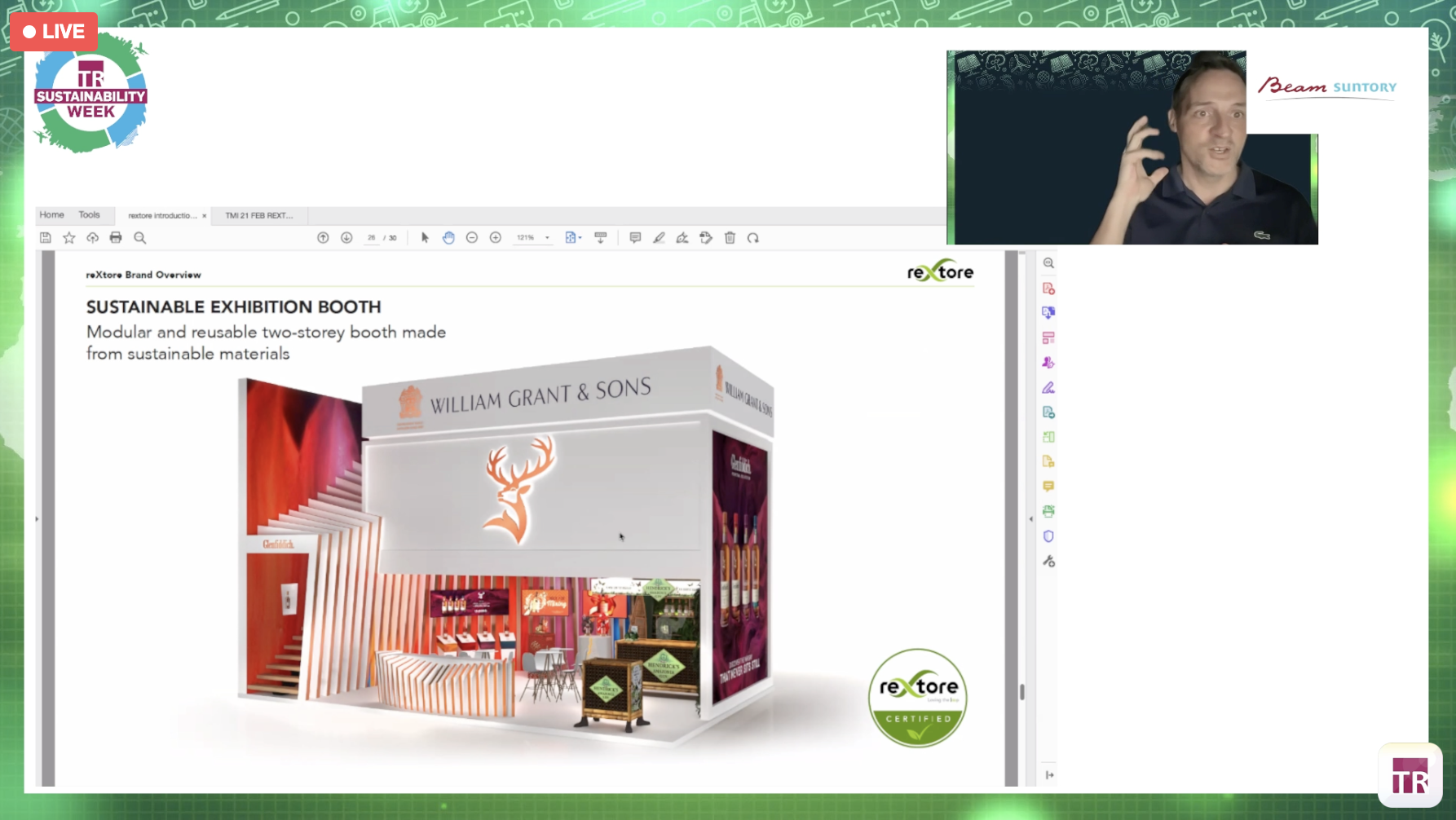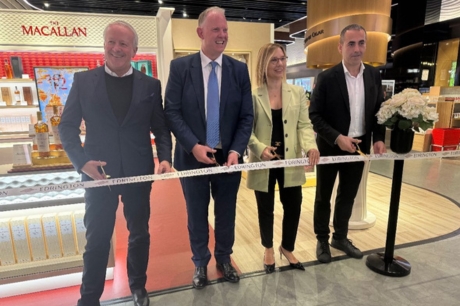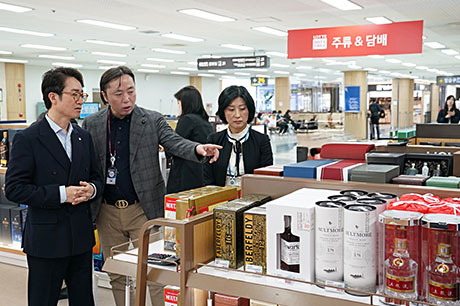TR Sustainability Week: Calls for airports to ‘level up’ in contracts
By Kristiane Sherry |

Airports need to ‘level up’, a panel of design experts at TR Sustainability Week has agreed.
A TR Sustainability Week panel of packaging designers have called on airports to take environmental considerations more seriously in their tender processes. Abu Dhabi was hailed as “the only airport that’s really enforced to its duty free partners to have sustainable practices”.
A group of design and packaging experts were speaking on the Green by Design panel, exploring how stakeholders from across the supply chain need to collaborate innovatively.
The panel comprised Paola Avogadro, Global Packaging Design Director at Ferrero Soremartec; Simon Dipple, Senior Vice President International Business Development at BellaGiada; Duncan Craig, Global Project Director, Concourse Display Management; Monica Kominami, Project and CSR Director, Travel Essentials Global, at Lagardère Travel Retail; Tracy Ross, Projects & Design Manager, Sustainability Champion & LEED Green Associate at AerRianta Middle East; Sergio Salvagno, General Manager, Ferrero Travel Market; and
Hugo Vanderschaegh, Managing Director at Altavia Travel Retail.
After an introduction from moderator Faye Bartle, Ross opened with an assessment of the ‘reduce, reuse, recycle’ model
‘It’s the essence of what we now know as the circular economy, which I believe is radically changing our thinking in the design process,” she said.
While the concept of ‘green design’ has been around since the early 2000s, there’s now a much broader focus. She called out materials used, products sold, their ingredients, the manner in which they sourced, how they are wrapped and packaged, and how their packaging is disposed of.
TR Sustainability Week: ‘It starts with the airport’
In global travel retail, it all starts with the airport, “filtering down to your concessionaires and all the way down to the suppliers, their furniture and fittings, their product and their packaging,” she continued.
While Ross feels suppliers have embraced ESG, other stakeholders, chiefly airports, have not.
“What I believe now needs a greatest shift is this progression from a linear to a circular economy, looking at the end of your product lifecycle,” she explained. “Because there’s no point in specifying sustainable materials if 18 to 24 months later, you’re going to pull your furniture out and dispose of it.”
She advocated for sustainable principles to be written into agreements. “Contracts between airports and concessionaires, and between concessionaires and retail.”
Vanderschaegh agreed. “Today duty free operators are not really pushed up a level to do things more sustainably.”
Ross added that from personal experience, from the tenders that cross her desk, there is not enough ambition.
“I think the stage and the opportunity for where terminal operators need to level up is at the tender stage, call it out and add a heavier weighting.” She added that short contracts did not help.
“I don’t believe it is necessary every time to strip out and refurbish,” she continued, noting that light fittings could be reused. Equipment and furniture need longer life cycles.

Abu Dhabi’s new Terminal A was celebrated as a sustainability success
Vanderschaegh then celebrated Abu Dhabi’s new Terminal A. “The only airport that’s really enforced to its duty free partners to have sustainable practices is Abu Dhabi. It’s the only one to really put in place KPIs and scoring that push every bidder to sustainable design.”
He also called for tougher industry-wide guidelines and legislation. “I feel like when it comes to sustainability it is like single use plastic. Why did we stop using single use plastic in supermarkets? Because the government said ‘no more is allowed’.”
Ross said she believed there was a “huge, huge gap” between the practices at Abu Dhabi and other airports (Schiphol, Hong Kong, and some in New Zealand were also lauded for their sustainability strategies). ‘If the legislation and regulations aren’t in place at at airport level, they will be bypassed because there is an associated cost, unfortunately.”
Kominami then gave her perspective. ‘Each airport is reacting in different ways,” she said. “Geneva has great recycling system. So for them banning single use plastic isn’t necessarily the priority because they have a great system already in place.”
She added that plastic wasn’t necessarily the enemy. “It’s more about saying, we need to, we need to have governance, we need to have resources to recycle and dispose of things in the right way.We need to exit from a linear economy to a circular economy.”
No one global approach
Vanderschaegh agreed. “We cannot apply one rule across the world. I think every market has difficulties. In some markets, it is going to be related to power consumption. [In another] market it’s about plastic pollution. In other markets it’s about water.”
The importance of consumer awareness was then raised by Simon Dipple. “One of the most important things we can do as brands and businesses at the moment is to help educate our customers,” he said.
“One of the things that I really encourage our customers to do is place QR codes onto their packaging with microsites that are relevant to the packaging.”
He described this type of engagement as “one of the most important things” all stakeholders can do when it comes to tackling waste through design.
Ferrero’s Salvagno then echoed Ross’s earlier point about repurposing retail furniture. While airport regulations and requirements differ by country, he’s working with materials that are repairable and can be refreshed.
“We developed a platform of gondolas that follow these rules without any constraint for the airport.” He said the challenge wasn’t cost, rather it was finding the right supplier.
The result, and the furniture he has today, is modular, can display different brands, and has a long lifespan. “It’s responsible, and very, very simple.”

Ferrero is working on modular retail furniture for its confectionery brands.
Concourse Display Management’s Craig has also developed sustainable gondolas. “Yes, they’re coming in at 30% higher pricing. And that’s putting a lot of people off. But that’s a CapEx thing. And what’s interesting is that if you look at it over the lifecycle, over three to five years, actually, it’s a lot cheaper.”
He cited some alarming facts about the impact of the build environment. “It produces around 40% of global emissions,” he outlined. “I think it’s 60% of landfill is caused by the construction industry.”
Concrete, as a material, contributes the most of global warming, followed by steel and aluminium. “We’re looking at trying to swap them out.”
He also said that global society is forecast to build the equivalent of a city the size of New York every month for the next 40 years. The industry has to be more mindful of airport construction.
‘Can’t fight every battle’
Vanderschaegh joined the conversation to stress that the industry “can’t fight every battle in every project”. Ross added that more clarity is needed on materials.
“I think the war on single-use plastics over the last two years has demonstrated that where the focus has been shifting to alternatives, you find out that the CO2 footprint is greater,” she referred to an earlier question over what was better, plastic or aluminium? “It’s got to be a balance.”
Craig also noted that the traceability of products is “a nightmare”. “We don’t know where wood comes from,” he said, bringing a perspective from working in Asia. “It’s got FSC stamped all over it, but it’s not. It’s Coming from rainforests.”
Ferrero’s Avogadro returned the focus back to the consumer. “You need to really change people’s mindset and teach them the language of sustainability,” she outlined. “It’s not enough to just design something which the consumer will love, you have to design something where they will also understand what to do with this thing at the end of life.”
Packaging designers, she continued, have to be across different regulatory changes, too. “You have to have an interest in sustainability, you have to have an understanding of packaging legislation, boring as it may be.
“You have to know what the single use plastics directive says, and what the packaging recirculation is going to bring in, and what the deforestation regulation is going to ask for. Otherwise, you develop a project which in two years time is going to be banned or restricted.”

A sneak preview of William Grant’s sustainable stand.
The panel also touched on new packaging solutions, from seaweed-based materials to using rice. They also returned to the concept of modularity, making it easier for brands and retailers to do more with less.
Concourse Design Management’s Craig cited work he’s done with Mercedes to cut waste and roadshows, and with William Grant to develop a more sustainable stand for the TFWA World Exhibition. “The idea with this is that it will last for three years, you can dismantle it, you can change the campaign and put it back up,” he explained.
Wrapping up, the panellists concluded that more collaboration was needed across the entire supply chain in global travel retail. From working with airports and retailers, to engaging with recyclers, more attention is needed across the whole product journey.
The secret? “From our point of view, storytelling is a massive part of driving this forward,” Craig stated. “Because if you tell the right story, and you get clients excited by it, they’re more likely to embrace it and move forward with things.”
About TR Sustainability Week: 4-8 September 2023
Register for VIP access. You can sign up in seconds to stay updated on our dynamic digital content programme. If you haven’t already done so, please do register by clicking here. Registered delegates receive handy reminders about the content that’s available to view.
Join the live conference sessions. Sustainability is important to TRBusiness, which is why the event is 100% complimentary to attend. To join the live conference sessions on Tuesday 5 and Wednesday 6 September, please click here. All the live conference sessions will be available to watch on-demand, following the live broadcasts.
View our sustainability content. Stay close to the dedicated section on our website to view TR Sustainability Week content, including this year’s Sustainability Pitches.
Read the Sustainability Issue. The dedicated TRBusiness Sustainability Issue 2023 can be read here.
To find out more, about TR Sustainability Week 2023 please visit: www.
Thank you to our partners
TR Consumer Forum: Agenda & speakers revealed
Influential speakers will unpack the most effective strategies for understanding and engaging...
Saudia Arabia's KKIA unfurls T3 duty free expansion
King Khalid International Airport (KKIA) has unveiled the first stage of its much-vaunted duty...
OUT NOW: March/April Leading Americas Operators
The TRBusiness March/April 2024 edition boasting the inimitable leading Americas Operators...
-
 International,
International,TR Consumer Forum: Agenda & speakers revealed
-
 International,
International,Saudia Arabia's KKIA unfurls T3 duty free expansion
-
 International,
International,OUT NOW: March/April Leading Americas Operators

In the Magazine
TRBusiness Magazine is free to access. Read the latest issue now.

 Trbusiness. The travel retail Trbusiness. The magazine for global retail and duty free professionals.
Trbusiness. The travel retail Trbusiness. The magazine for global retail and duty free professionals.





















